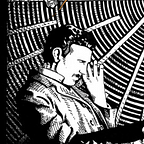He’d stopped photographing landscapes almost as soon as he had begun. In recent years, he has stopped photographing anyone. We would walk around the city for hours, his camera swinging from its noose by his side. It was always at the ready, but he would never lift it to his eyes and tell you to hold still.
“An artist has a single job, to bring something to life. But how do you give life to something that hasn’t died yet?”
He used to say such things when we first met. Part of what attracted me to him, I guess: the mind of an eccentric who could still tie his shoelaces and match his socks.
“I don’t think most people think of it quite so literally,” I remember saying once.
“Is there any other way?” It was his only reply.
Slowly, the walls of his studio became bare. He either sold most of his work or gave away what he couldn’t sell. He stopped spending time in his darkroom. Instead, he pored over newspapers looking for garage sales, yard sales, estate sales, anyone moving out of town. He circled them in thick black marker, then made a list with addresses and phone numbers arranged by upcoming dates. That’s how he spent most of his weekends, going from one sale to another, sometimes stopping at an antique store if there was one along the way. He had a single question when he got there: Do you have any old photographs?
Anything would do, but he preferred those people looking to unload entire shoeboxes of memories. Something a distant aunt or recently deceased grandmother kept away in a dusty attic, under the bed, or in a corner of a wardrobe. If they had any, he would buy the entire box.
At home he would spend hours mulling over them, making piles. The children in one pile, and the adults in another pile. As soon as a batch was sorted this way, he would summarily toss the pile with the adults in the garbage. Hundreds of images. From one dark corner to another.
The rest of the photographs he scrutinized more closely. He would turn them over and read their inscriptions: names, places, salutations, dates. It didn’t matter so much when and where the pictures were taken or who they were. He wanted to know when the photographs stopped being taken. William ______, 1923–1929. Or anything with the words: In Loving Memory.
Those photographs, maybe one or two out of a hundred, he held on to. And when we would go on our walks around the city, he would bring along his camera and those photographs.
“Think about it,” he’d say. “What’s one thing you wish you did when you were little that you never got to do?”
“Oh, I don’t know. I can’t remember.”
“C’mon, c’mon,” he’d press. “There has to be something you really wanted to do but never had the chance.”
“The Empire State Building, I guess. I’ve lived my whole life in this city, and I still have never been to the top of the Empire State Building. Can you believe that?”
And without a second thought, he would turn and head in the direction of whatever place or thing went through my head that day. Other times, he would follow his own whims and not speak a word until we got to whatever it was that had materialized in his head. Once there, he would take out his set of old photographs and flip through them, selecting the one he felt most appropriate. He would prop it up against a railing, the skyline opening up beyond, or the lights of a rollercoaster causing multicolored streaks against the darkness. Sometimes, the picture lay simply in a field in Central Park, on a bench, on a seat in an old movie theater, the film rolling through the starry dust above our heads.
When the image was lined up just right, he would snap a shot and pick up the old photograph and put it away at the back of the pile. And in each of the photographs, as he was looking through the viewfinder and I was looking at him looking at them, the eyes and faces of those children would stare back at us from among blades of grass or leaning on a park swing on a summer afternoon.
“Well, what did you think of the Empire State Building?” he would ask. “Billy here looked like he had a good time; don’t you think?” and he would pat his side pocket with the photographs.
ANDREI GURUIANU is a Senior Language Lecturer in the Expository Writing Program at New York University where he has taught since 2011. His critical and creative works often explore such topics as memory and forgetting, the role of art and of the artist, and the ability of place to shape personal and collective histories. More of his work can be found at andreiguruianu.com.
2015 Luminaire Award for Best Prose Finalist
Originally published on The Spark on 6/19/15
